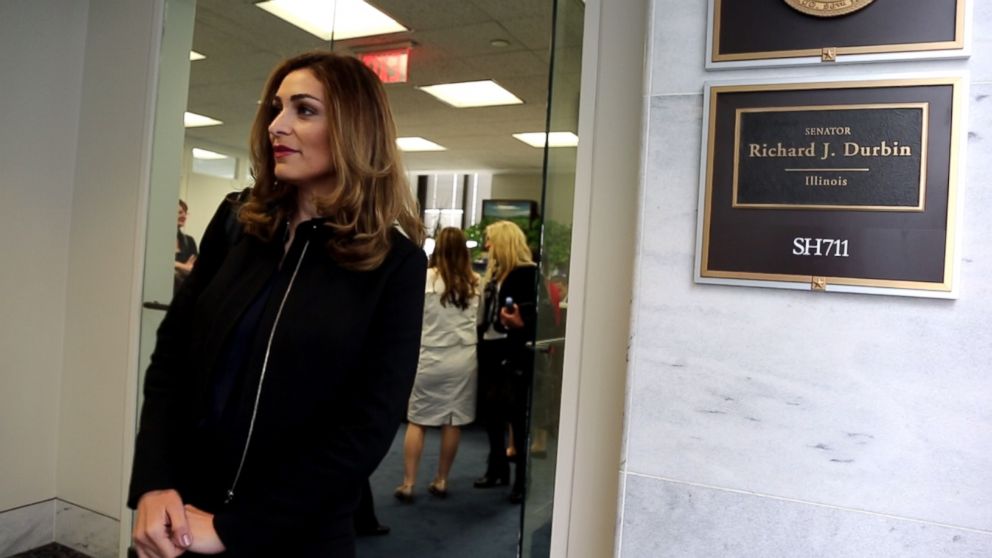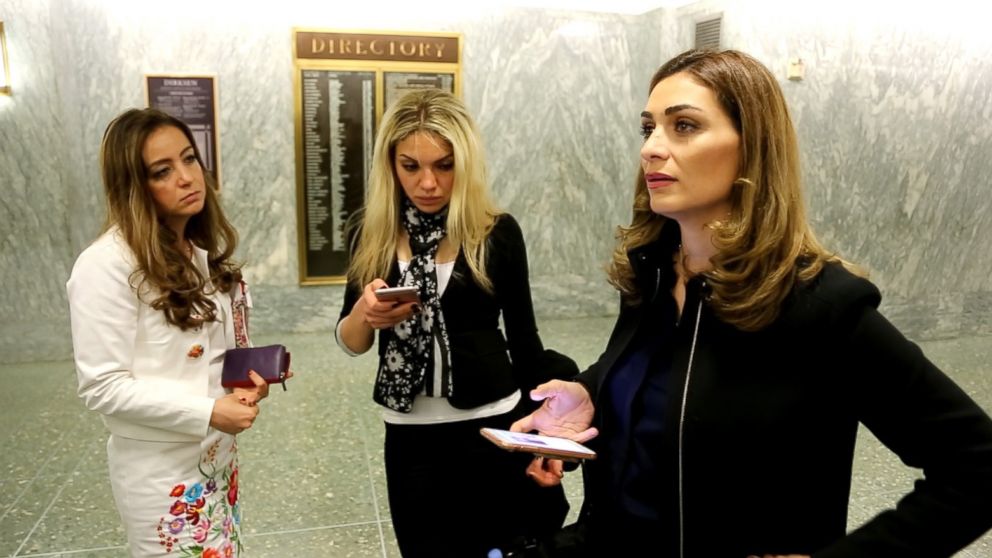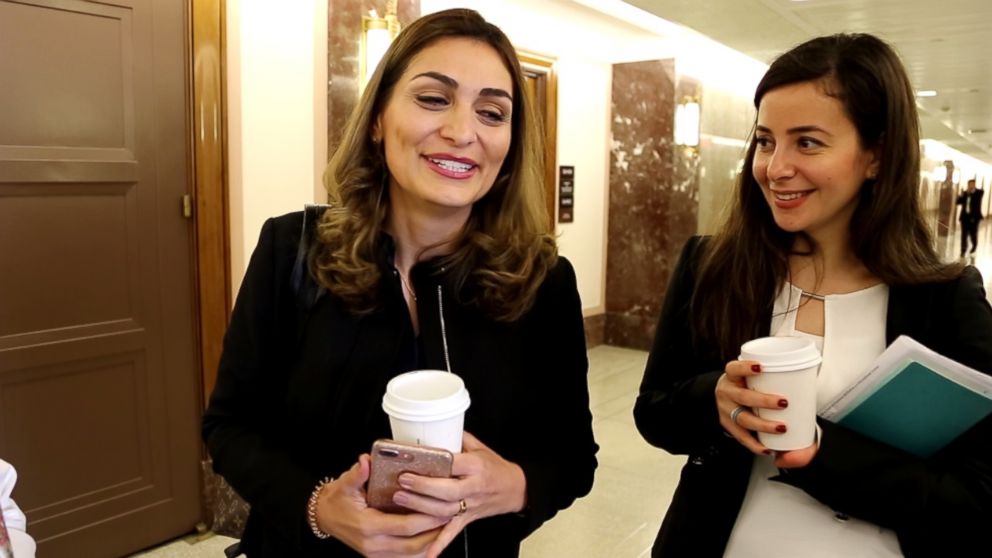Meet the 'brave' Syrian women who came to the US to change their country’s fate
A delegation of activists and civil society leaders spoke on Capitol Hill.
— -- Ahed Festuk stood outside the Washington, D.C., office of Sen. Dick Durbin, D-Illinois, waiting for an aide to come and collect her. With her long blond hair, black jeans and flowered scarf, she looked very much like any other millennial living in her adopted home of Brooklyn, New York.
But Festuk was nervous. Along with four other Syrian women, she was on Capitol Hill Wednesday to share the reality on the ground in the city that is truly her home: Aleppo.
“I feel I have a big responsibility,” Festuk, 30, said. “Even if they only listen to me five percent, it’s a big responsibility.”
Festuk said she was among the first people to protest against Syria’s authoritarian leader, Bashar al-Assad, in Aleppo in 2011. But much has changed in Syria for her since those first moments of the revolution.
The uprising, now a full-blown civil war, has killed more than half a million people and displaced 5 million others over the past six years. Since December 2015, when she was granted political asylum, Festuk has been living in the United States on her own, learning English and trying to advocate for her country.
“I love to tell people I’m from Syria. Some people say, ‘You’re not scared to say that?’ But why should I be scared? I’m brave to be from Syria and be part of the Syrian revolution,” she said.
It’s that pride, and optimism for Syria’s future, that brought Festuk and the four other Syrian women to Washington this week. Since President Trump launched an airstrike against the Syrian military April 7 and his secretary of state declared that “the reign of the Assad family is coming to an end,” the future of Syria is being discussed around the world.
But Festuk and the other women from her delegation said the voices of Syrian women have been noticeably absent from those discussions.
“It’s probably 95 percent Western men, and then the other 5 percent are Syrian men, and then us,” Noha Alkamcha, who works with Syrian local councils and civil society organizations, said.
Alkamcha, 32, said there are “a million women behind the scenes doing the actual work,” but few are quoted in the international press and even fewer have seats at the negotiating table.
The women’s tour is helping to change that. Along with Festuk and Alkamcha, three other women -- Zaina Erhaim, Yasmin Kayali and a woman who asked that her identity not be revealed for safety reasons -- met with congressional staff from the offices of Durbin, Sen. Bob Corker, R-Tennessee, and the Senate Foreign Relations Committee as well as international organizations this week.

Erhaim, a journalist and the Syria coordinator at the Institute for War and Peace Reporting, helped organize the delegation.
“We are really here to promote Syrian civil society, to promote Syrians’ rights and to promote the fact that Syrians are people, they are faces and human beings, they are not just numbers you see on the news,” Erhaim, 32, said. “Not all Syrians are Assadis or ISIS.”
But that fact has been lost in much of the media coverage and political discourse around Syria, experts say.
Some of that is because of Assad’s own strategy, said Ibrahim al-Assil, a fellow at the Middle East Institute. Weakening or silencing civil society organizations like the ones these women represent helps Assad stay in power, he said.
“Assad controls only some territories inside Syria but, at the same time, the regime is not allowing any kind of work for civil society or local governments in the territories outside its control,” al-Assil said. “They want to make it clear that it’s either the regime -- or that the other option will be just chaos. They don’t want another alternative to emerge.”
But building alternatives is crucial to eventually rebuilding Syria, the women said, even if how Syria transitions to a democracy is unclear.
And they have been on the forefront of that work for years. Alkamcha said she helped organize more than 300 civil society organizations to define their vision in 2016 before the Geneva peace talks.

Kayali, 35, founded Basmeh and Zeitooneh, a humanitarian organization that works with Syrian refugees in Lebanon and Turkey.
“Today, this conflict has so many different international players and so many different geopolitical levels that it is very difficult to answer how it will end,” Kayali said. “I’m sure the end is going to surprise us all, but regardless of how it ends, we need to prepare for that end and we need to prepare for the day after.”
“The work that we are doing on the ground is to be able to later rebuild Syria,” she added.
Barry Pavel, senior vice president at the Atlantic Council who worked on defense policy for both the George W. Bush and Obama administrations, said Trump’s recent airstrikes gave the United States new leverage in helping end the conflict in Syria. But he stressed that ensuring that there is a “very robust and resilient plan for a political transition” is crucial to the country’s future.
He also said the United States has much to learn from its policies in Iraq.
“It’s not about the days after, it’s about the years after Assad goes,” Pavel said. “We want to make sure the situation isn’t more dangerous than it was than before he went.
“There has to be a structured, deliberate diplomatic plan that moves Syria toward a new future,” he added.
Alkamcha said Syrian women are eager to be part of that plan.
"The U.S. does not have any successful story of intervention in history -- that we are very familiar with," she said. "When Tillerson says this is the end of Assad's era, we 100 percent support that ... But with a clear strategy for political transition and who will be the alternative for Assad.
“Definitely, the civil society and opposition will be an alternative, but we want to be involved in that decision-making by the U.S.”

As Kayali waited for a meeting with staffers from the Senate Foreign Relations Committee to begin, she watched a video of her 5-year-old son that had been sent via WhatsApp from her family in Jordan. Although her children missed her, she said, she felt she had an obligation to share what was happening more than 5,700 miles away in their homeland.
“I believe that this is my duty to my people,” Kayali said. “I believe I am fortunate to be able to move around because of the passport I have and because of my ability to speak the English language. I think I owe it to my people to give them a voice.”
For Festuk, it’s also about giving voice to protesters who lost their lives opposing Assad.
She said she remembers attending her first demonstration in the early days of the uprising in 2011. The protest lasted only five minutes but felt “like five hours,” she said, before the protesters were chased off by police and soldiers.
But those five minutes with a few people swelled within months to more than 10,000 people protesting in Aleppo, she said. Despite the fact that it was dangerous, they kept protesting, sure that a better future was within reach.
“It was really an amazing feeling,” she said. “At that time, I felt that soon we would be successful, soon we would take the Assad regime out, and that soon we would overthrow them and their regime.”
She paused, looking out the window of the Hart Office Building toward the manicured lawns of D.C. and the vast marble steps of the U.S. Supreme Court.
“But it doesn’t work like that. Actually, the whole world supported [the regime] and left us behind. No one listened to us,” she said.
“When I remember those days and how we lost amazing people,” she said, stopping in mid-sentence as tears came to her eyes.
Still, Festuk said, she would go back to Syria the “next day” if Assad were removed from power.
“I love my country, I love Syria, and especially Aleppo,” she said. “I will go immediately.”
An earlier version of this story listed the delegation’s scheduled congressional meetings. This story has been updated to reflect the offices the delegation met with.




